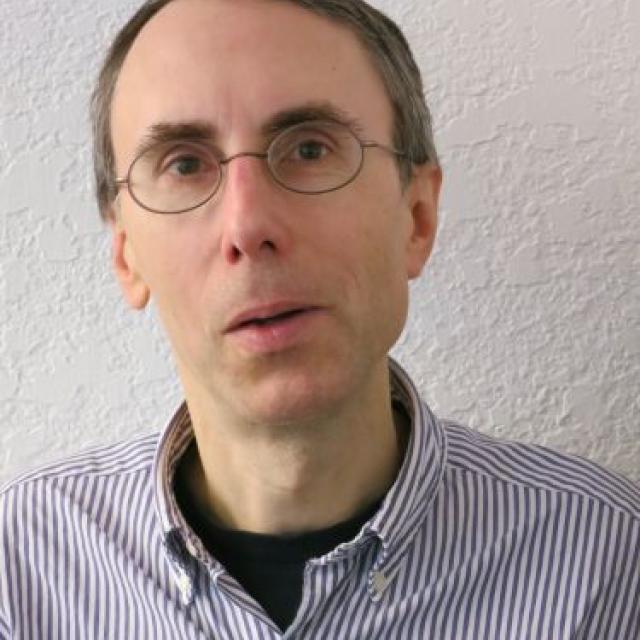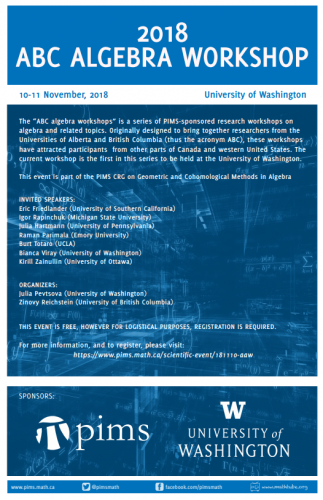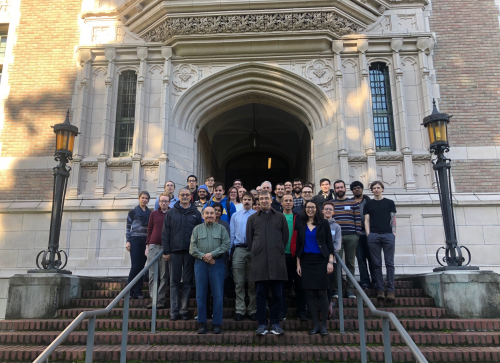ABC Algebra Workshop
Speakers
Details
The "ABC algebra workshops" is a series of PIMS-sponsored research workshops on algebra and related topics. Originally designed to bring together researchers from the Universities of Alberta and British Columbia (thus the acronym ABC), these workshops have attracted participants from other parts of Canada and western United States. The current workshop is the first in this series to be held at the University of Washington. We have assembled a distinguished group of speakers on a wide range of topics, at the interface of algebraic geometry, the theory of algebraic groups, algebraic topology, algebraic number theory, representation theory, cohomology theory and algebraic combinatorics.
The poster for this event can be downloaded below:
Confirmed Speakers and Abstracts:
Eric Friedlander (University of Southern California):
The Mathematics of Andrei Suslin
We highlight some of the amazing mathematics proved by Andrei Suslin. Andrei worked in commutative algebra, algebraic K-theory, cohomology of groups, algebraic geometry, and representation theory. This talk will include personal reminiscences of my close friend and collaborator, Andrei Suslin.
Julia Hartmann (University of Pennsylvania)
Local-global principles for linear algebraic groups over arithmetic function fields
We consider linear algebraic groups over arithmetic function fields, i.e., over one variable function fields over complete discretely valued fields. Such function fields naturally admit several collections of overfields with respect to which one can study local-global principles. We will recall results about local-global principles for rational linear algebraic groups, and then mention two different generalizations; to local-global principles for 0-cycles, and to local-global principles for certain nonrational tori.
Raman Parimala (Emory University)
The Rost invariant for simply connected groups
There is an invariant of Rost for torsors under absolutely simple simply connected linear algebraic group with values in degree three Galois cohomology. We discuss how far the vanishing of this invariant guarantees the triviality of the torsor over function fields of p-adic curves.
Igor Rapinchuk (Michigan State University)
Algebraic groups with good reduction and unramified cohomology
Let G be an absolutely almost simple algebraic group over a field K, which we assume to be equipped with a natural set V of discrete valuations. In this talk, our focus will be on the K-forms of G that have good reduction at all v in V . When K is the fraction field of a Dedekind domain, a similar question was considered by G. Harder; the case where K=Q and V is the set of all p-adic places was analyzed in detail by B.H. Gross and B. Conrad. I will discuss several emerging results in the higher-dimensional situation, where K is the function field k(C) of a smooth geometrically irreducible curve C over a number field k, or even an arbitrary finitely generated field. These problems turn out to be closely related to finiteness properties of unramified cohomology, and I will present available results over various classes of fields. I will also highlight some connections with other questions involving the genus of G (i.e., the set of isomorphism classes of K-forms of G having the same isomorphism classes of maximal K-tori as G), Hasse principles, etc. The talk will be based in part on joint work with V. Chernousov and A. Rapinchuk.
Burt Totaro (UCLA)
Asymptotics of tensor products.
Benson and Symonds defined a real number associated to any modular representation M of a finite group G. This invariant describes the asymptotic growth of the non-projective summand of a high tensor power of M. It turns out that low values of the invariant correspond to meaningful classes of modules, and that there are gaps in the possible values. We survey what is known in this direction.
Bianca Viray (University of Washington)
The Brauer group and rational points.
Let X be a smooth projective variety of degree d over a number field k. In 1970 Manin observed that elements of the Brauer group of X can obstruct the existence of a k-point, even when X is everywhere locally soluble. In joint work with Brendan Creutz, we prove that if X is geometrically abelian, Kummer, or bielliptic then this Brauer-Manin obstruction to the existence of a k-point can be detected from only the d-primary torsion Brauer classes. (In the case when X is bielliptic, the result is conditional on the finiteness of the Tate-Shafarevich group for j-invariant 0 elliptic curves.). If time permits, we will discuss joint work with Creutz and Voloch that shows that the situation is quite different for general type curves.
Kirill Zaynullin (University of Ottawa)
Twisted quadratic foldings and structure algebras.
We introduce and study twisted foldings of root systems which generalize usual involutive foldings corresponding to automorphisms of Dynkin diagrams. Our motivating example is the celebrated projection of the root system of type E8 onto the subring of icosians of the quaternion algebra which gives the root system of type H4. Using moment graph techniques we show that such a twisted folding induces a map at the level of equivariant cohomology/structure algebras.
Workshop Schedule:
Saturday, November 10, 2018
9:00am - 10:00am: Julia Hartmann
10:00am - 10:30pm: Break
10:30am - 11:30am: Raman Parimala
11:30am - 11:45am: Break
11:45 am- 12:45pm: Igor Rapinchuk
12:45am - 2:30pm: Lunch and Networking
2:30pm - 3:30pm: Eric Friedlander
3:30pm - 4:00pm: Break
4:00pm - 5:00pm: Kirill Zaynullin
Sunday, November 11, 2018
9:00am - 10:00am: Bianca Viray
10:00am - 10:30pm: Break
10:30am - 11:30am: Burt Tortaro
Group Picture:
This event is part of the PIMS CRG on Geometric and Cohomological Methods in Algebra.
Additional Information
Location:
University of Washington Campus, Seattle.
Savery Hall, Room 264 http://www.washington.edu/maps/#!/sav
Accommodation:
We have made a block of rooms at the Stay Pineapple University Inn,4140 Roosevelt Way NE. Guests are to call 866.866.7977 before Thursday, October 11, 2018 to secure their guest rooms. Please refer to the “Geometric and Cohomological Methods in Algebra.” to receive the group rate.
Reservations may also be made online direclty here staypineapple.com.
Applications for funding:
There is some partial funding available to junior particpants attending the workshop. Graduate students and Postdocs should apply for funding using the link here.
Registration:
This event is free, however for logistical purposes, registration is required.
Please register here.



